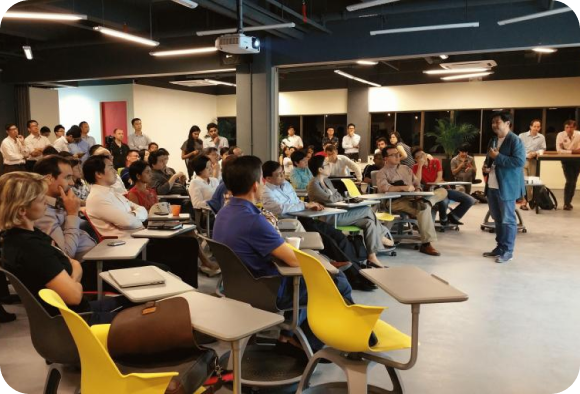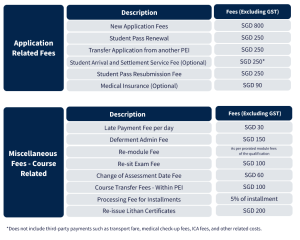Top Up Master of Science in Computing
- Homepage
- Top Up Master of Science in Computing
Master of Science in Computing
6 months Full-Time
Software Engineering
Master’s Degree
University of Roehampton, UK

Master of Science in Computing
6 months Full-Time
Software Engineering
Master’s Degree
University of Roehampton, UK

Course Overview
The MSc Computing program is designed as a conversion master’s program specifically tailored for individuals with non-computing backgrounds. It offers a blend of practical skills and foundational theoretical knowledge with the goal of preparing students for careers in IT.
It provides a strong basis in computer science education, with a particular focus on software development, databases, and cyber security. What sets this program apart is its emphasis on collaborative and ethical practices, which are integrated throughout the curriculum, making teamwork a standard approach.
The primary aim is to prepare students for the contemporary IT workplace, going beyond the traditional focus on skill-based learning in computing.
Demonstrate understanding of the knowledge of systems architecture in computing.
Gain a systematic understanding of methods, techniques and tools for information modeling, management, and security.
Develop a systematic understanding of management techniques and their relationship with computing.
Incorporate a critical ethical dimension to their practice, managing the legal, social, ethical, and professional issues of computing.
Autonomously implement and evaluate improvements to own performance and evaluation in the specification, design, construction, and evaluation of computer-based systems

E-Learning
132 hours
132 hours

Workshop / Seminar
92 hours
92 hours

Tutorial
12 hours
12 hours

Guided Learning Hours
236 hours
236 hours

Self-paced Learning
1564 hours
1564 hours
Target Audience
Candidates who have completed the following and willing to transition their career into IT field and get master degree
- Minimum bachelor’s degree from a recognized university
- Recognized professional qualification with relevant work experience.
- Polytechnic Diploma holders in STEM with minimum 5 years of relevant working experience
- Matured candidates with relevant work experience for minimum 8 years
Admission Prerequisites
Graduation Requirements

Minimum Age:
21 Years
21 Years
Academic Qualification:
- A second-class degree from a recognized British or overseas university.
- Non-graduates with appropriate professional qualifications will be considered on an individual basis by Programme Conveners.
English Proficiency:
- IELTS – 6.0 (with no elements lower than 5.5)
- C6 in English at GCE “O” level
- Letter from College/University clearly stating the Medium of Instruction of the highest qualification to be English or its equivalent.

- Minimum attendance of 75% in all the sessions of each module
- Minimum pass grade in the summative assessment of each module
Graduation Requirements

- Minimum attendance of 75% in all the sessions of each module
- Minimum pass grade in the summative assessment of each module
Module Summary
Module 1
Module 2
Module 3
Module 4
Module 5
Module 6
Module 7
Module 1
Software Development – 1
Explore the principles and techniques of presenting data effectively. Starting with visualisation design and perceptual foundations, learn to create visualisations tailored to different data types. Get evaluated through user studies and apply findings in data reporting. The module integrates web development for interactive visualisations, covering both front-end and back-end processes. It builds on Data Science skills, preparing students for diverse data presentation contexts like business reporting and scientific visualisation.
What You’ll Learn
- Introduction to Programming
- Basic syntax and semantics of a higher-level language
- Common code patterns
- Data Manipulation in Python
- Simple I/O : Creating, storing & retrieving files
- Functions in Python
- Recussion and Exceptions
- Introduction to fundamental concepts of algorithms
- Object Orientation
Module 2
Databases
Builds foundational knowledge in the modelling, access, and modification of data. The module examines how database systems function in the general case, as well as providing specific topics focused on relational data storage. Databases will examine data modelling using concept models (e.g., entity relationship), spreadsheet models, relational data models, and object-oriented models. SQL will be the core language used throughout the module, with content covering selection, joining, and grouping queries.
What You’ll Learn
- Introduction to Data and Database Management System
- Entity Relationship Diagram (ERD)
- Introduction to SQL_DDL and DML
- Data Model
- Normalisation
- Database Transaction
- Relational Algebra
- Advanced_SQL:Subquery
Module 3
Software Development – 2
Builds on the foundation delivered in Software Development 1 by examining in detail the programming paradigms of object-oriented and event-driven. With regard to the object-oriented paradigm, students will examine object design, inheritance, and encapsulation. For event-driven programming, students will learn about event handlers and the development of Graphical User Interfaces (GUI) applications.
What You’ll Learn
- Introduction web application
- GIT and Kanban
- JavaScript and event-driven programming
- Starting node.Js and express.Js
- Building a dev environment and connecting to the database
- Database driven applications
- Building the front-end with templating
- MVC/OOP design patterns
Module 4
Computer Systems
Introduces students to the fundamental concepts, methodologies, and techniques of computer systems and hardware. Understanding how a computer operates is key to understanding many aspects of computer science, and incorporates ideas of logic design, state machines, and network communications. This module introduces the fundamental principles of computer systems, including logic design, state machines, assembly level representation, performance evaluation, parallel systems, and network organisation.
What You’ll Learn
- What is computer systems
- Introduction to Logic design
- State Machines
- Von Neumann Machines
- Introduction to Assembly Programming
- Network hardware and design
- OSI model and Network protocols
- Routing & Switching & World Wide Web
- Introduction to system performance evaluation
- Introduction to parallel systems
Module 5
Computing & Society
Examines the role computing takes in society. The module incorporates ideas from ethical practice, usability and accessibility, sustainability, and an introduction to the legal frameworks related to computing. Understanding people (users) and their needs is fundamental to the modern computer scientist, who develops systems for people. Furthermore, ethical concerns on computer use and the professional requirements surrounding these concerns are essential in the modern IT workplace.
What You’ll Learn
- Computing & Society Introduction
- Human Computer Interaction (HCI) and User experience (UX)
- Stakeholder identification and the Software Development Lifecycle
- Digital Tools for Collaboration and Communication
- Collaboration Tools, Workflows and Professional Responsibilities
- Discount’ Usability Testing
- Professional Practice: Legal and Ethical Considerations
- Professional Practice: Intellectual Property + Ethical Issues in Emerging Technologies
- Sustainability: Environmental Impact of Computing
- Design Challenge Preparation
Module 6
Cyber Security
Explores the risks and mitigations inherent to computer use. The module incorporates ideas from ethical practice, risk management, legal considerations, and technology- based solutions to address computer security issues. Cyber Security begins by examining the concept of privacy from a philosophical, legal, and ethical standpoint, before exploring some of the technology used to protect an individual’s privacy.
What You’ll Learn
- Deploy a Sandboxed Network (Portfolio) Part 1
- Deploy a Sandboxed Network (Portfolio) Part 2
- Asset Detection and Reconnaissance (Portfolio) Part 1
- Asset Detection and Reconnaissance (Portfolio) Part 2
- Vulnerability Scanning (Portfolio) Part 1
- Vulnerability Scanning (Portfolio) Part 2
- Vulnerability Scanning (Portfolio) Part 3
- Vulnerability Scanning (Portfolio) Part 4
- OWASP Juice Shop Challenge (Portfolio) Part 1
- OWASP Portfolio Part 2 and Practical Exam Preparation
Module 7
MSc Project
The MSc Project allows students to explore a topic of their choosing based on their own interests as agreed and supported via a member of the academic team. The project provides an opportunity for students to research and deliver a significant piece of individual work that incorporates the practical and analytical skills presented in their programme.
What You’ll Learn
The MSc Project will enable students to explore a topic of their choice. There are four project- types planned:
- Student-defined
- Academic-defined (research-based)
- Industry-defined
- Social enterprise
Module 1
Module 2
Module 3
Module 4
Module 5
Module 6
Module 7
Module 1
Software Development – 1
Introduces students to the fundamental concepts, methodologies, and techniques of software development. Programming is a key component of computer science and is an in-demand skill for the workplace inside and outside of the IT industry. Software Development 1 introduces the fundamental principles of software development, including syntax and semantics, variables and primitive data, expressions and assignment, input-output, conditions, iteration, functions, recursion, and an introduction to algorithms.
What You’ll Learn
- Introduction to Programming
- Basic syntax and semantics of a higher-level language
- Common code patterns
- Data Manipulation in Python
- Simple I/O : Creating, storing & retrieving files
- Functions in Python
- Recussion and Exceptions
- Introduction to fundamental concepts of algorithms
- Object Orientation
Module 2
Databases
Builds foundational knowledge in the modelling, access, and modification of data. The module examines how database systems function in the general case, as well as providing specific topics focused on relational data storage. Databases will examine data modelling using concept models (e.g., entity relationship), spreadsheet models, relational data models, and object-oriented models. SQL will be the core language used throughout the module, with content covering selection, joining, and grouping queries.
What You’ll Learn
- Introduction to Data and Database Management System
- Entity Relationship Diagram (ERD)
- Introduction to SQL_DDL and DML
- Data Model
- Normalisation
- Database Transaction
- Relational Algebra
- Advanced_SQL: Subquery
Module 3
Software Development – 2
Builds on the foundation delivered in Software Development 1 by examining in detail the programming paradigms of object-oriented and event-driven. With regard to the object-oriented paradigm, students will examine object design, inheritance, and encapsulation. For event-driven programming, students will learn about event handlers and the development of Graphical User Interfaces (GUI) applications.
What You’ll Learn
- Introduction web application
- GIT and Kanban
- JavaScript and event-driven programming
- Starting node.Js and express.Js
- Building a dev environment and connecting to the database
- Database driven applications
- Building the front-end with templating
- MVC/OOP design patterns
Module 4
Computer Systems
Introduces students to the fundamental concepts, methodologies, and techniques of computer systems and hardware. Understanding how a computer operates is key to understanding many aspects of computer science, and incorporates ideas of logic design, state machines, and network communications. This module introduces the fundamental principles of computer systems, including logic design, state machines, assembly level representation, performance evaluation, parallel systems, and network organisation.
What You’ll Learn
- What is computer systems
- Introduction to Logic design
- State Machines
- Von Neumann Machines
- Introduction to Assembly Programming
- Network hardware and design
- OSI model and Network protocols
- Routing & Switching & World Wide Web
- Introduction to system performance evaluation
- Introduction to parallel systems
Module 5
Computing & Society
Examines the role computing takes in society. The module incorporates ideas from ethical practice, usability and accessibility, sustainability, and an introduction to the legal frameworks related to computing. Understanding people (users) and their needs is fundamental to the modern computer scientist, who develops systems for people. Furthermore, ethical concerns on computer use and the professional requirements surrounding these concerns are essential in the modern IT workplace.
What You’ll Learn
- Computing & Society Introduction
- Human Computer Interaction (HCI) and User experience (UX)
- Stakeholder identification and the Software Development Lifecycle
- Digital Tools for Collaboration and Communication
- Collaboration Tools, Workflows and Professional Responsibilities
- Discount’ Usability Testing
- Professional Practice: Legal and Ethical Considerations
- Professional Practice: Intellectual Property + Ethical Issues in Emerging Technologies
- Sustainability: Environmental Impact of Computing
- Design Challenge Preparation
Module 6
Cyber Security
Explores the risks and mitigations inherent to computer use. The module incorporates ideas from ethical practice, risk management, legal considerations, and technology- based solutions to address computer security issues. Cyber Security begins by examining the concept of privacy from a philosophical, legal, and ethical standpoint, before exploring some of the technology used to protect an individual’s privacy.
What You’ll Learn
- Deploy a Sandboxed Network (Portfolio) Part 1
- Deploy a Sandboxed Network (Portfolio) Part 2
- Asset Detection and Reconnaissance (Portfolio) Part 1
- Asset Detection and Reconnaissance (Portfolio) Part 2
- Vulnerability Scanning (Portfolio) Part 1
- Vulnerability Scanning (Portfolio) Part 2
- Vulnerability Scanning (Portfolio) Part 3
- Vulnerability Scanning (Portfolio) Part 4
- OWASP Juice Shop Challenge (Portfolio) Part 1
- OWASP Portfolio Part 2 and Practical Exam Preparation
Module 7
MSc Project
The MSc Project allows students to explore a topic of their choosing based on their own interests as agreed and supported via a member of the academic team. The project provides an opportunity for students to research and deliver a significant piece of individual work that incorporates the practical and analytical skills presented in their programme.
What You’ll Learn
The MSc Project will enable students to explore a topic of their choice. There are four project- types planned:
- Student-defined
- Academic-defined (research-based)
- Industry-defined
- Social enterprise
Certification(s)

Certification(s) Earned
- Master of Science in Computing awarded by University of Roehampton, UK
About University of Roehampton
The University of Roehampton, London, has a proud history in higher education stretching back 180 years. While still focused on its pioneering values and teaching heritage from its 19th-century collegiate roots, the University has developed a diverse curriculum that reflects London’s multicultural creative spirit. It offers a high-quality UK education experience to more than 10,000 students from 141 countries.
Known for its commitment to personalized learning and academic excellence, Roehampton offers a range of undergraduate, postgraduate, and research programs across various disciplines. With a focus on preparing students for successful careers and fulfilling lives, the university emphasizes innovative teaching methods, research-led learning, and strong community engagement. Roehampton values diversity, creativity, and critical thinking, shaping global citizens who contribute positively to society.
Learn more roehampton.ac.uk


